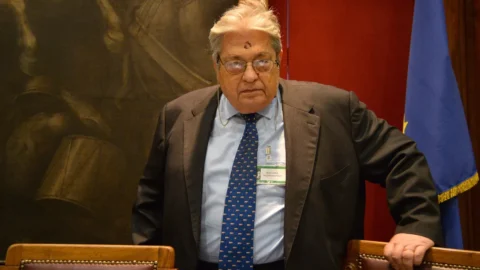Without a new union, the modernization of the country remains an illusion, but the union must profoundly change and open up to the new generations, "who are the real emergency of the country". This is what Marco Bentivogli, leader of the metalworkers of the Cisl and one of the few innovative voices of the trade union movement, has been repeating for some time and which he will also say in the trade union demonstrations of this May Day. After winning one of the most difficult national contracts for metalworkers, Bentivogli is preparing to field courageous proposals on work and future pensions and also has something to say to Matteo Renzi: "He remains a resource for the country but he must be convinced that populism must be challenged and not pursued and must broaden the field of those who fight for change: in the union you cannot lump everything together and the alternative cannot be between Camusso and the establishment”. Here is the interview that Bentivogli gave to FIRSTonline on the occasion of May Day.
Bentivogli, the metalworkers arrive this year at the appointment on May XNUMX with a new national labor contract and with the success of the union agreements in the Italian plants of Fiat Chrysler, but also with numerous corporate crises (from Alcoa to Piombino): Is the balance sheet of a year of union battles in the leading industry category active or in the red?
“The balance sheet of the last year of union battles among metalworkers is certainly positive, if we consider that we had to renew the most difficult national contract in the history of metalworkers in a very problematic general economic and political context. Being able to sign a new contract and doing it, for the first time after many years, in a unified way and with contents whose innovative significance is recognized by all, is an indisputable success which once again makes the metalworkers' union an important point of reference for industrial relations, even if the open corporate crises do not allow anyone to rest on their laurels. Furthermore, let us not forget that the defense of employment, pursued precisely through bargaining during crises and company restructurings, has allowed us to save 100 jobs in an industrial sector, such as the engineering sector, which has been decimated by the crisis general which has canceled 300 jobs in our category”.
However, very complex corporate crises remain on the table: after May XNUMX, what will be the agenda and the route of the metalworkers?
“The growth in demand for steel is an encouraging economic sign that can anticipate the restart of the economy and industry, but the company crises ahead are difficult and demanding. First of all we have to deal with the uncertainty that continues to dominate the final tender for Ilva and for the Taranto plant which needs, like bread, a reliable plan to relaunch in safety. Then, just to mention the most relevant, there are the cases of the former Lucchini of Piombino and of Alcoa in Sardinia. In Piombino we are faced with a sensational case of non-compliance by the Algerian property with respect to which the union has not the slightest intention of giving up and will continue the mobilization until a positive solution is glimpsed for the workers. On the other hand, some more hope seems to light up for Alcoa in the face of the signs of interest shown by the Swiss of Sideralloys: we are not letting our guard down but perhaps something is moving and we will work for a breakthrough agreement”.
The new elements that the national contract for metalworkers has introduced, such as company welfare, smartworking, the right to training and others, and the shift of the center of gravity of trade union relations towards company bargaining, also for SME employees, with the he eye on productivity can be considered as the first steps towards a renewal of bargaining in view of Industry 4.0 and in the direction of a new way of doing trade unions?
“Yes, the subjective right to training and the revision of the professional framework are the heart of the new national contract which, not surprisingly, refers to the historical one of 1973 and which takes into account the new challenges that Industry 4.0 brings with it and which require a trade union capable of understanding and actively dealing with the epochal changes taking place all over the world. However, I want to underline that the defensive agreements that we have made at company level also move in the same innovative direction and have facilitated reshoring, i.e. the return to Italy of previously delocalized productions which today are based on new enabling technologies that we must know how to govern in order to reconcile employment and technological innovation, without slipping into adventurous and improbable terrains such as those who would like to tax robots or those who are thinking of welfare solutions such as basic income".
On a general level, the Fim-Cisl has fought in recent months in support of the constitutional reform, which however was rejected by the referendum of 4 December, and for the improvement of vouchers, which the referendum promoted by the CGIL instead prompted the Government to cancel: how much do these two defeats of the reforming wing weigh on the renewal of the entire trade union movement?
“Unfortunately, our country has historically been in check by the colorful coalitions of 'not doing' which, when faced with problems, refuse any discussion of the merits and choose the comfortable path of immobilism and conservatism, even if cloaked in the most improbable demagogic proclamations. One can have any idea about the constitutional reform, but it is incontrovertible that the reform of Title V which governs relations between the State and the Regions would have made Anpal more effective as a vehicle for an active labor policy. As for vouchers, you don't need to be a prophet to imagine that their total abolition will end up fueling undeclared work. These are very serious questions to reflect on if we want to intercept, not only in words, the very strong demand for change that comes from workers and young people, but which risks remaining in the air”.
The national congress of the Fim-Cisl will be held in two months, which has so far been one of the few innovative and nonconformist voices in a trade union movement often unable to resolve the dichotomy between antagonism and reformism: what will be the cornerstones of your congress?
"At the center of the Fim-Cisl congress, which we will hold in Rome from 7 to 9 June, will be the new generations, who represent the real emergency of the country and who risk being cut off from the world of work and from all forms of protection present and future society. The union must open up and go beyond the gates of the factories, which an entire generation has never been able to enter. This is why we are thinking of developing alternating school-work and proposing a generalized civil service, which has nothing to do with basic income, but which aims to reconcile work and solidarity in concrete terms. This is also the reason why we propose the compulsory nature of supplementary pensions. For a trade union worthy of the name, thinking less about today's pensions and thinking more about those who risk never having a pension or having one that is completely insufficient is not an option but a moral duty, even before a political and union one " .
Sunday, April 30 Matteo Renzi, barring unforeseen events, is about to be crowned again as secretary of the Democratic Party: from the union point of view, what kind of politics do you expect from Renzi 2.0? Is he still the leader who can re-launch the reform policy or are the defeat in the referendum and the stability of the M5S destined to put him out of the game?
“There is no doubt that Matteo Renzi remains a resource for the country but I hope he reflects on the mistakes he has made and treasures the experience. I hope that, as Macron is doing in France, Renzi will be convinced that populism must be challenged and not pursued, even at the cost of a few whistles. And I hope you will find the courage not only to resume the path of reform and modernization of Italy but also to broaden the front of those who are fighting for real change, starting with the union, which certainly needs to be re-founded but in which can make a bundle of all herbs. The alternative cannot be between Camusso and the finance elites. There are many other energies that can be put in place for the modernization of Italy, the renewal of the union and the renewal of the country go hand in hand: we are deeply convinced of this and it would be a good step forward if this line were also Renzi's new course".





